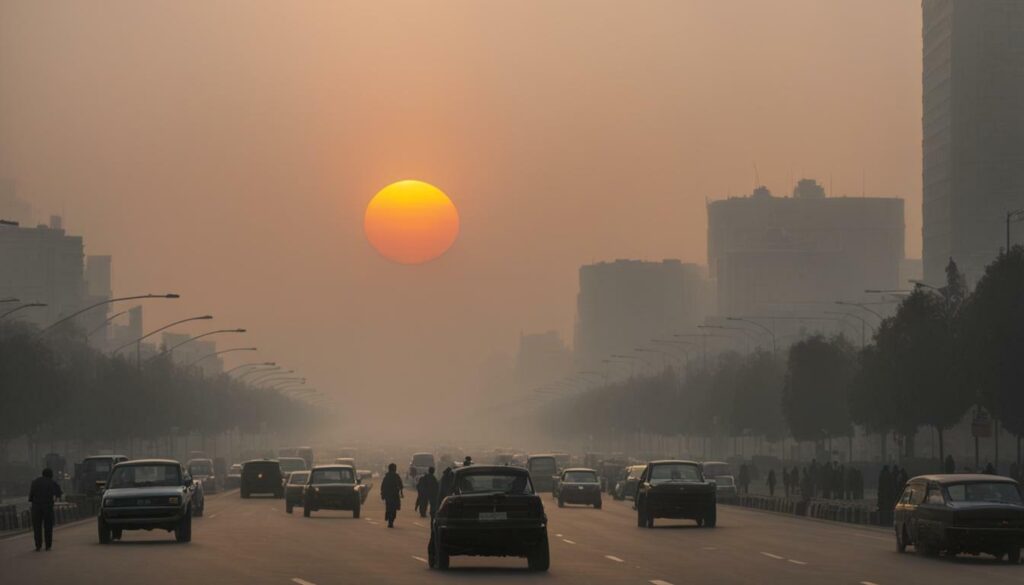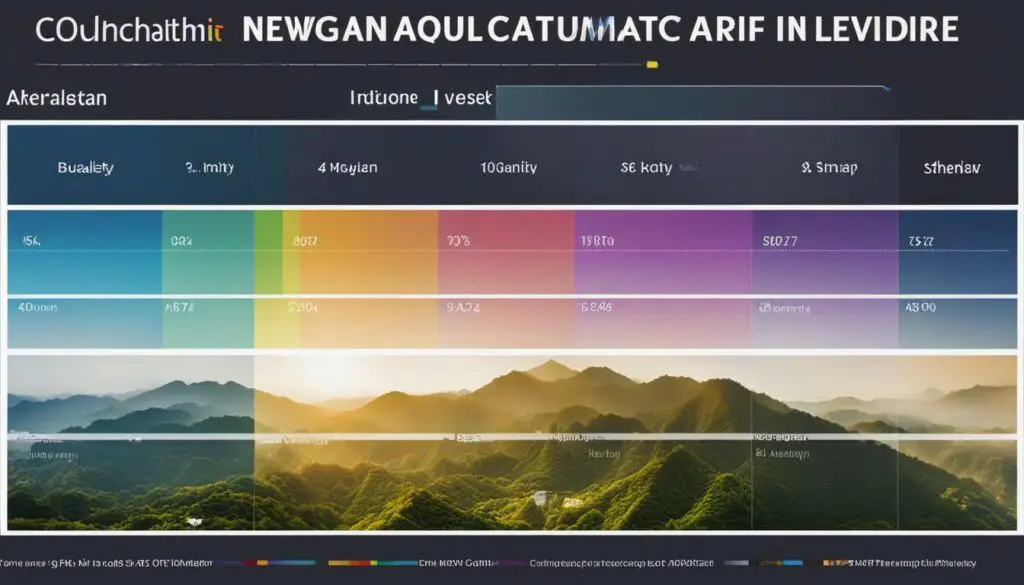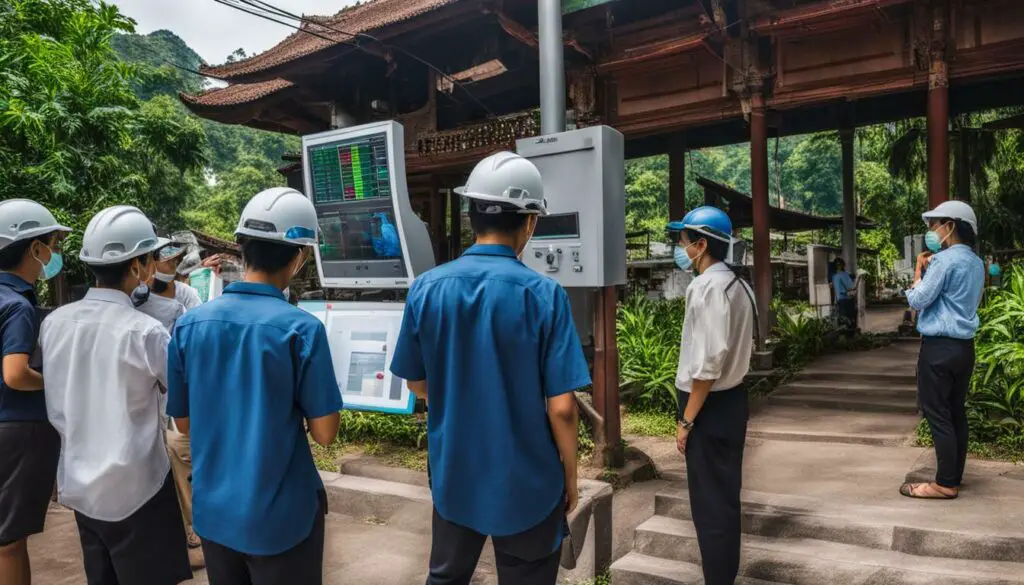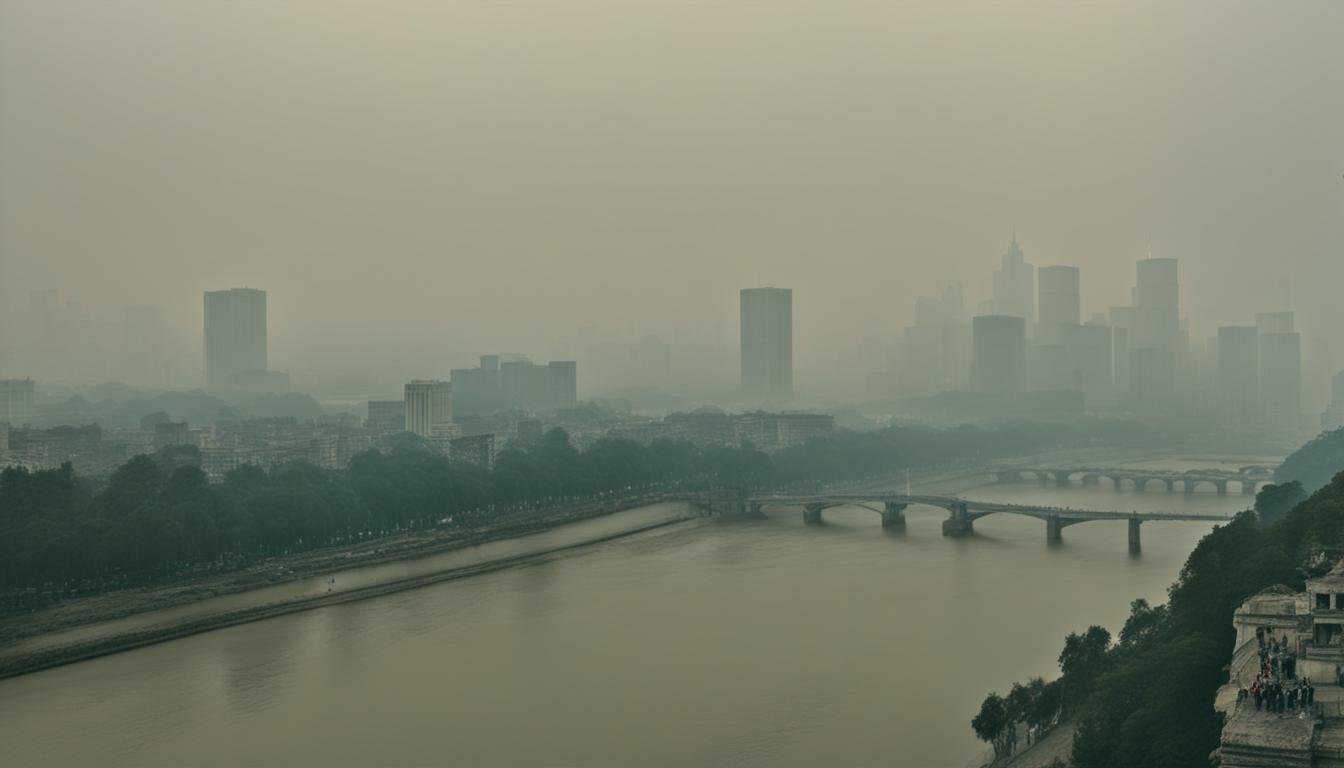Chiang Mai, a city in northern Thailand, has been grappling with poor air quality in recent years, particularly during its annual smog season. The issue has become a major concern for residents and tourists alike, as increased air pollution levels can lead to a variety of health problems.
It is crucial to understand the impact of air pollution in Chiang Mai and take the necessary precautions to protect oneself. This guide aims to provide comprehensive information on Chiang Mai air quality and its effects on public health and the environment.
- Chiang Mai has experienced poor air quality in recent years, particularly during its annual smog season.
- Increased air pollution levels can lead to a variety of health problems, making it crucial to understand and monitor air quality in the region.
- Through education and awareness, individuals can take steps to protect themselves from the harmful effects of air pollution.
- Government initiatives and community-driven efforts are underway to improve Chiang Mai’s air quality and promote clean air initiatives.
- Access to real-time air quality data is available through reliable resources, which allow individuals to make informed decisions and take the necessary precautions.
The Importance of Monitoring Air Quality
Air quality monitoring is essential in Chiang Mai due to the high levels of pollutants in the air. It is crucial to stay informed about pollution levels to make informed decisions regarding outdoor activities. In recent years, Chiang Mai has experienced increased levels of air pollution, particularly during the dry season. Particulate matter (PM) has been identified as the main pollutant in the air in Chiang Mai.
The PM level in the air can be measured with an air quality monitor. The monitor provides real-time data on the concentration of pollutants in the air. The data is then used to determine the air quality index (AQI), which informs individuals about the level of air pollution and the associated health risks. The AQI is a scale from 0 to 500, with higher numbers indicating higher levels of pollution.
It is important to monitor air quality regularly, especially during periods of increased pollution levels, to protect against the harmful effects of air pollution. Monitoring air quality in Chiang Mai is easy, and there are several sources of information available. The Pollution Control Department (PCD) of Thailand and the United States Embassy in Thailand provide real-time air quality data for Chiang Mai. Additionally, several mobile applications are available that provide air quality information and alerts.

Regular air quality monitoring allows individuals to take appropriate measures to protect themselves and reduce their exposure to pollutants. For example, if the AQI is high, individuals can limit their outdoor activities, wear masks, and ensure that their indoor air quality is optimal. Monitoring air quality can also provide valuable insights for policymakers to develop effective strategies to improve air quality in Chiang Mai.
Exploring Air Pollution in Chiang Mai
Chiang Mai has been experiencing poor air quality due to the presence of smog and pollutant particles. The causes of air pollution in Chiang Mai are mainly attributed to forest fires, agricultural burning, transportation emissions, and industrial activities. Smoke from neighboring countries, especially during the dry season, also contributes to the high levels of pollution in the region.
Smog, a form of air pollution, is a mixture of smoke and fog, which creates a hazy atmosphere that reduces visibility. Pollutant particles, such as PM2.5 and PM10, are small enough to penetrate deep into the lungs and cause respiratory problems.
According to a recent study, burning practices for agriculture and forest fires are the primary culprits for the high levels of fine particulate matter in Chiang Mai. The study proposes that reducing the number of fires and using alternative farming methods can help to decrease the amount of particulate matter in the air and improve air quality.
The government of Thailand has also implemented measures to control air pollution, such as imposing restrictions on vehicle emissions and promoting public transportation. In addition, there are ongoing efforts to promote green energy and reduce emissions from industrial activities.

It is important to note that poor air quality can have a significant impact on public health. Exposure to high levels of pollutants can lead to respiratory problems, such as asthma, bronchitis, and emphysema. It can also increase the risk of heart disease and stroke.
Understanding the Air Quality Index
The Air Quality Index (AQI) is a measure of air pollution levels in a specific area, including Chiang Mai. It is a tool used to provide information on the quality of the air, and it helps to determine potential health risks associated with exposure to pollutants.
The AQI is measured on a scale of 0-500, with a higher number indicating a greater level of pollution. There are six categories defined by the U.S. Environmental Protection Agency, indicating the level of health concern:
| AQI Range | Health Concern | Action |
|---|---|---|
| 0-50 | Good | None |
| 51-100 | Moderate | Unusually sensitive individuals should consider reducing prolonged or heavy exertion. |
| 101-150 | Unhealthy for Sensitive Groups | Sensitive individuals should reduce prolonged or heavy exertion. It is recommended that everyone else should reduce prolonged or heavy exertion. |
| 151-200 | Unhealthy | Sensitive individuals should avoid prolonged or heavy exertion. Everyone else should reduce prolonged or heavy exertion. |
| 201-300 | Very Unhealthy | Sensitive individuals should avoid all physical exertion outdoors. Everyone else should avoid prolonged or heavy exertion. |
| 301-500 | Hazardous | Everyone should avoid all physical activity outdoors. |
The AQI is based on five pollutants regulated by the Clean Air Act, including ground-level ozone, particle pollution, carbon monoxide, sulfur dioxide, and nitrogen dioxide. In Chiang Mai, the most prevalent pollutants are particulate matter, nitrogen dioxide, and ozone.
Monitoring the AQI is important in determining the extent of air pollution in Chiang Mai and taking necessary precautions to protect one’s health. It is recommended to regularly check the AQI and adjust outdoor activities accordingly, especially during high pollution periods.

Knowing the AQI is an essential step towards safeguarding against the potential health risks associated with air pollution. By staying informed about current pollution levels, individuals can take the necessary steps to reduce their exposure and protect their respiratory health.
Impacts of Poor Air Quality on Health
Exposure to poor air quality in Chiang Mai can have serious consequences on the respiratory health of individuals. The fine particles in polluted air can penetrate deep into the lungs causing inflammation, and over time, can lead to chronic respiratory diseases such as asthma, bronchitis, and emphysema.
Researchers have also found a strong correlation between exposure to air pollution and respiratory infections, especially in children and the elderly. Long-term exposure to polluted air also contributes to an increased risk of heart disease, strokes, and lung cancer.
The World Health Organization (WHO) estimates that globally, air pollution contributes to 7 million premature deaths annually. In Thailand, the problem is particularly acute, with air pollution cited as the cause of over 50,000 premature deaths each year.

To reduce the risk of respiratory illness, it is essential to be aware of the air quality levels in Chiang Mai and take appropriate measures to protect oneself from exposure to pollution. In times of high pollution, it is recommended to stay indoors or wear a mask when outdoors. For those with pre-existing respiratory conditions, it is advisable to consult a doctor for appropriate precautions and treatment.
Risks of Prolonged Exposure to Air Pollution
Prolonged exposure to air pollution in Chiang Mai can have serious health consequences, particularly for respiratory health. The pollutants found in the air, such as particulate matter and ozone, can have both short-term and long-term effects on the lungs and airways.
Short-term effects can include irritation of the eyes, nose, and throat, and exacerbation of existing respiratory conditions such as asthma and chronic obstructive pulmonary disease (COPD). Long-term exposure to air pollution can cause damage to the respiratory system, leading to chronic respiratory diseases such as bronchitis, emphysema and lung cancer.
According to the World Health Organization (WHO), air pollution is responsible for approximately 7 million premature deaths every year, and respiratory diseases such as asthma and COPD are among the most common causes of death attributable to air pollution.
It is particularly important for individuals with pre-existing respiratory conditions to take measures to protect themselves against air pollution, such as minimizing outdoor activities during periods of high pollution, wearing properly fitted masks, and seeking medical attention if experiencing respiratory symptoms.

It is also important for individuals to advocate for clean air initiatives and support policies aimed at reducing air pollution. By taking action to improve air quality in Chiang Mai, individuals can help protect their own respiratory health as well as the health of the community as a whole.
Measures to Control Air Quality
To combat the issue of poor air quality in Chiang Mai, various measures have been implemented to reduce pollution levels and promote clean air. The government has introduced several policies and regulations to control emissions from factories, vehicles, and other sources. These measures include:
| Air Quality Control Measures | Description |
|---|---|
| Vehicle Emission Standards | Strict emission standards for vehicles and regular checks to ensure compliance |
| Industry Regulations | Regulations to limit emissions from factories and industrial activities |
| Ban on Outdoor Burning | Prohibition of outdoor burning of waste and crops during high pollution periods |
| Green Spaces | Creation and preservation of green spaces and urban forests to promote air quality |
These measures have contributed to the decrease in pollution levels and improvement of air quality in Chiang Mai. However, it is important to continue enforcing and implementing such regulations to sustain the progress toward cleaner air.

Community-driven initiatives have also played a crucial role in improving air quality in Chiang Mai. Several local organizations and groups have taken it upon themselves to create awareness about the importance of clean air and work towards reducing pollution levels. Some of these initiatives include:
- Volunteer-led clean-up drives and awareness campaigns
- Green initiatives focused on planting more trees and creating green spaces
- Alternative solutions for waste management
Such initiatives have not only helped in reducing pollution levels but also in creating a sense of responsibility and accountability among the public towards the environment.
Protecting Yourself from Air Pollution
Protecting oneself from air pollution in Chiang Mai is crucial for maintaining good respiratory health. Here are some practical tips and recommendations:
- Avoid outdoor activities during periods of high pollution levels. Check the air quality index and plan outdoor activities accordingly.
- Use an air purifier in your home or workplace to improve indoor air quality as pollutants can come from inside or outside.
- Wear a mask when outside, especially during high pollution periods, to reduce exposure to pollutants.
- Use public transportation or carpool to reduce personal emissions and contribute to better air quality.
- Support clean air initiatives and advocate for policies and regulations to reduce pollution levels in Chiang Mai.

By implementing these measures, individuals can take an active role in protecting their respiratory health and promoting a cleaner environment in Chiang Mai.
Clean Air Initiatives in Chiang Mai
Chiang Mai residents are taking active steps to promote clean air and reduce air pollution levels in the region. The city has seen an increased awareness and engagement in various clean air initiatives, driven by concerned citizens, local organizations, and the government.
The Chiang Mai Clean Air Network is one of the prominent organizations that have been advocating for clean air in the region. They have been working on initiatives such as planting trees, promoting cycling, and advocating for eco-friendly transportation options. They have also organized public events and campaigns to raise awareness about air pollution and its impact on health.
In addition to citizen-led efforts, the government has also implemented policies and regulations aimed at reducing air pollution levels. In 2020, the Chiang Mai government introduced a Clean Air Act, which outlines measures to control air pollution and improve air quality in the region. The act includes enforcement of stricter emissions standards for vehicles, measures to reduce burning activities, and the promotion of clean energy sources.
Collaborations between international organizations and local groups have also led to clean air initiatives in Chiang Mai. The US Consulate in Chiang Mai has partnered with local organizations to promote air quality awareness and provide equipment for air quality monitoring. The International Sustainable Development Studies Institute (ISDSI) works on sustainable development projects, including promoting clean air in Chiang Mai.
With the ongoing efforts, Chiang Mai is gradually improving its air quality, and the city is moving towards a more sustainable and eco-friendly future.

Staying informed about air quality monitoring in Chiang Mai is essential for protecting oneself from the harmful effects of air pollution. Fortunately, there are several resources available to access real-time air quality data in the region.
One of the most reliable sources is the Air Quality Index Chiang Mai provided by the Air Quality Monitoring Network in Thailand. The website provides up-to-date AQI readings for various locations in Chiang Mai, along with information on the sources and health effects of air pollution.
Another useful resource is the AirVisual app which provides real-time air quality data, hourly and daily AQI forecasts, and personalized health recommendations based on pollution levels in Chiang Mai.
For individuals interested in monitoring indoor air quality in their homes or workplaces, the Foobot air quality monitor is a reliable option that measures indoor air quality and gives personalized recommendations to improve air quality.
Overall, having access to reliable air quality information is crucial for making informed decisions about outdoor activities and protecting respiratory health in Chiang Mai.

Although there are many clean air initiatives in Chiang Mai, individuals can also play a crucial role in improving air quality in the region. By making conscious choices and adopting responsible behavior, individuals can reduce pollution levels and create a cleaner environment.
- Reduce vehicle emissions: Using public transportation, carpooling, or biking instead of driving a car can significantly reduce vehicle emissions, a major contributor to air pollution in Chiang Mai. Additionally, regularly servicing vehicles and ensuring they are in good condition can help minimize emissions.
- Conserve energy: Conserving energy not only helps preserve natural resources but also reduces emissions from power plants. Simple actions such as turning off lights and unplugging electronics when not in use can make a significant impact.
- Avoid burning: Burning waste, trash, or biomass is a common practice in Chiang Mai that significantly contributes to air pollution. Avoiding burning and using alternative methods for waste disposal, such as composting or recycling, can help improve air quality.
- Support clean air initiatives: Supporting community-driven clean air initiatives and advocating for government policies that prioritize air quality can help create a cleaner and healthier environment in Chiang Mai.
By taking simple steps to reduce emissions and support clean air initiatives, individuals can help improve air quality in Chiang Mai and protect their respiratory health. Together, these individual efforts can lead to a significant reduction in pollution levels and create a more sustainable future for the region.

Chiang Mai’s air quality has become a cause for concern due to high levels of air pollution. Exposure to pollutants can lead to respiratory problems and other health complications, making it crucial to understand and take action to address the issue.
This article has provided a comprehensive guide to Chiang Mai’s air quality, highlighting the importance of monitoring pollution levels and the measures taken to control air quality. It also offered practical tips and recommendations to protect oneself from air pollution during high pollution periods.
It is essential to support clean air initiatives that aim to reduce air pollution levels in Chiang Mai. By making conscious choices and implementing simple lifestyle changes, individuals can contribute to creating a cleaner environment and safeguarding their health.
The Way Forward
Chiang Mai’s residents must unite to tackle the problem of air pollution using both individual and collective efforts. Every individual must take responsibility for the steps they take to reduce air pollution, such as taking public transport with clean air filters or avoiding driving as much as possible.
The government, businesses, communities and individuals can collectively work together to implement clean air policies, promote clean technologies and create public awareness. By taking proactive measures, we can create a healthier and more sustainable living environment for ourselves and future generations.
With the right awareness, efforts and willingness, we can create a cleaner, brighter future for Chiang Mai, free of air pollution, and full of clean air initiatives.
FAQ
Q: Why is monitoring air quality important in Chiang Mai?
A: Monitoring air quality in Chiang Mai is crucial to stay informed about pollution levels and make informed decisions regarding outdoor activities. It helps individuals be aware of the current air quality conditions and their potential impact on respiratory health.
Q: What causes air pollution in Chiang Mai?
A: Air pollution in Chiang Mai is primarily caused by sources such as smog and pollutant particles. Factors like vehicle emissions, agricultural burning, and industrial activities contribute to poor air quality in the region.
Q: What is the Air Quality Index (AQI) and why is it important?
A: The Air Quality Index (AQI) is a measurement system used to assess the level of pollution in Chiang Mai. It provides an overview of the current air quality conditions and helps individuals understand the associated health risks.
Q: What are the health impacts of poor air quality in Chiang Mai?
A: Poor air quality in Chiang Mai can have significant health impacts, particularly on respiratory health. Exposure to pollutants can lead to respiratory problems and exacerbate existing conditions such as asthma and allergies.
Q: What are the risks of prolonged exposure to air pollution?
A: Prolonged exposure to air pollution in Chiang Mai can increase the risk of developing respiratory diseases and other health complications. Chronic exposure to pollutants can have long-term effects on respiratory health.
Q: What measures are taken to control air quality in Chiang Mai?
A: Various measures are implemented in Chiang Mai to control air quality. These include initiatives, regulations, and policies aimed at reducing pollution levels and improving overall air quality in the region.
Q: How can I protect myself from air pollution in Chiang Mai?
A: To protect yourself from air pollution in Chiang Mai, you can focus on maintaining indoor air quality, wearing masks in highly polluted areas, and minimizing exposure to pollutants during periods of high pollution.
Q: What clean air initiatives are taking place in Chiang Mai?
A: Chiang Mai is witnessing ongoing clean air initiatives driven by communities, government agencies, and collaborative projects. These initiatives aim to reduce pollution levels and promote clean air in the region.
Q: Where can I find reliable resources for air quality information in Chiang Mai?
A: There are several reliable resources and platforms available for accessing real-time air quality data in Chiang Mai. Websites, mobile applications, and other tools provide up-to-date information on pollution levels and air quality measurements.
Q: How can individuals contribute to improving air quality in Chiang Mai?
A: Individuals can play a significant role in improving air quality in Chiang Mai by making simple lifestyle changes, practicing responsible behavior, and getting involved in community-driven clean air initiatives.
Q: What is the conclusion and call to action regarding air pollution in Chiang Mai?
A: The conclusion emphasizes the importance of understanding and taking action to address air pollution in Chiang Mai. It encourages readers to support clean air initiatives and make conscious choices to protect their health and the environment.

